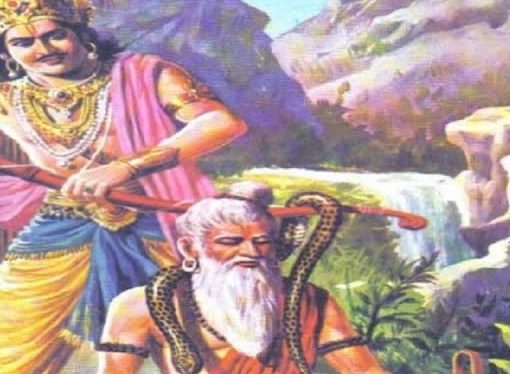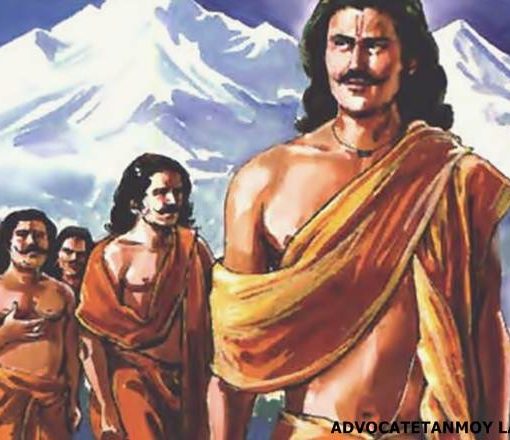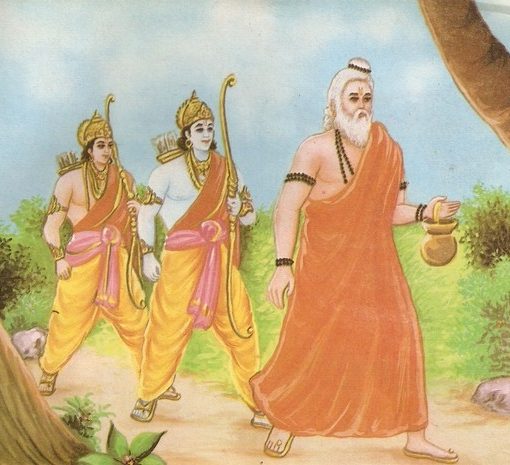In Chapter Thirteen of the Śrīmad-Bhāgavatam, we encounter one of the most touching and pivotal moments in the Mahābhārata era—the return of Vidura to Hastināpura. After years of pilgrimage and spiritual introspection, Vidura returns to his family, sparking a powerful dialogue with his brother, Dhṛtarāṣṭra, the blind king. This chapter is rich in spiritual teachings, emphasizing the principles of renunciation, detachment, self-realization, and the temporary nature of the material world.
Vidura’s Return: The Spiritual Seeker Comes Home
Vidura, one of the wisest and most devoted figures in the Kuru dynasty, returns to Hastināpura after a long period of pilgrimage. During his time away, Vidura had associated with many saints and sages, gaining deeper spiritual insights and knowledge about the nature of reality, God, and the soul. He had set out on this pilgrimage after being insulted by his nephew, Duryodhana, who rejected Vidura’s righteous advice during the Mahābhārata conflict.
His return to Hastināpura is not merely a physical event; it symbolizes the return of wisdom and righteousness to the royal family. Vidura’s presence brings a wave of spiritual transformation to the palace, as he is not just an elder brother but also a saintly guide. His character exemplifies the qualities of a true spiritual seeker—humility, dedication, patience, and unwavering faith in Krishna.
This aspect of Vidura’s return teaches us the importance of spiritual introspection and self-purification. In today’s fast-paced world, we often find ourselves entangled in material ambitions, losing sight of our spiritual goals. Vidura’s life reminds us that true success lies not in material achievements but in seeking spiritual knowledge, engaging in selfless service, and striving to understand our eternal relationship with God.
The Emotional Reunion: Family Bonds and Detachment
When Vidura arrives, he is warmly received by the members of the Kuru family, particularly Yudhiṣṭhira, who is overcome with emotion. Yudhiṣṭhira, along with the other Pandavas and Kauravas, embraces Vidura with love and respect. This reunion highlights the importance of family ties, but it also emphasizes a higher principle—detachment amidst affection. While Vidura shares deep love for his family, his spiritual journey has taught him that relationships in the material world are temporary and ultimately lead to suffering if one is overly attached.
This understanding is crucial for our own lives. Family relationships and social bonds are essential aspects of life, but they should not bind us to material illusions. By practicing detachment, we can love and serve our family members without becoming overly dependent on them for our happiness. This principle of yukta-vairāgya, or balanced renunciation, encourages us to fulfill our worldly duties while keeping our hearts anchored in Krishna consciousness.
Vidura’s Dialogue with Dhṛtarāṣṭra: The Call to Renounce
One of the most significant parts of this chapter is Vidura’s conversation with his elder brother, Dhṛtarāṣṭra. Vidura’s words are direct and unambiguous; he urges Dhṛtarāṣṭra to renounce the material comforts of the palace and dedicate his remaining years to spiritual realization. He points out the futility of Dhṛtarāṣṭra’s attachment to the royal throne, which had brought him nothing but sorrow, deceit, and destruction.
Vidura’s appeal to Dhṛtarāṣṭra is filled with both compassion and urgency. He reminds his brother that death is inevitable, and the time to prepare for it is now. His message is not limited to Dhṛtarāṣṭra alone; it is relevant to all of us. We often live as if we are immortal, clinging to wealth, status, and relationships, forgetting that these are temporary. Vidura’s words encourage us to face the reality of death and prepare for it by cultivating devotion, knowledge, and detachment.
This is a lesson in spiritual urgency. The pursuit of material success should not eclipse our primary duty—to realize our spiritual nature and cultivate a loving relationship with Krishna. Vidura’s guidance inspires us to focus on eternal truths rather than temporary gains.
Dhṛtarāṣṭra’s Transformation: From Attachment to Renunciation
Vidura’s powerful words awaken Dhṛtarāṣṭra from his illusion. The blind king, who had been living under the shelter of Yudhiṣṭhira despite the destruction caused by his sons, finally realizes the futility of clinging to royal comforts. He decides to leave the palace and retire to the forest with his wife, Gāndhārī, to pursue spiritual austerities.
Dhṛtarāṣṭra’s decision to renounce the palace is a significant turning point, symbolizing the power of saintly association and the importance of sincere repentance. Although he had lived a life filled with misjudgments and attachment, Dhṛtarāṣṭra’s final choice demonstrates that it is never too late to turn towards spirituality. His renunciation serves as a reminder that spiritual transformation is possible for anyone, regardless of their past actions.
In our own spiritual journey, we may face challenges due to past mistakes or attachments. However, Dhṛtarāṣṭra’s transformation teaches us that Krishna’s mercy is available to all, provided we have the humility and sincerity to seek it. It emphasizes the importance of repentance, self-reflection, and the willingness to change.
The Power of Association: Vidura’s Role as a Guide
Vidura’s return and his role in guiding Dhṛtarāṣṭra underscore the immense value of sādhu-saṅga, or association with saintly persons. Vidura’s spiritual wisdom, humility, and compassion enable him to influence even the most stubborn hearts. His presence acts as a catalyst for Dhṛtarāṣṭra’s transformation, highlighting the importance of seeking guidance from spiritually advanced individuals.
In the modern world, finding genuine spiritual guidance can be challenging, but it remains essential for spiritual growth. Just as Vidura guided Dhṛtarāṣṭra, we too should seek out guru, sādhu, and śāstra—the spiritual master, saintly devotees, and scriptures—to gain clarity, strength, and inspiration on our path. Association with devotees not only helps us understand the teachings of the Bhāgavatam but also reinforces our commitment to living a Krishna-conscious life.
Gāndhārī’s Silent Support: Lessons in Devotion and Duty
Gāndhārī, the devoted wife of Dhṛtarāṣṭra, silently supports her husband’s decision to leave the palace. Throughout her life, Gāndhārī had displayed immense forbearance, patience, and devotion, despite the tragedies and losses she endured. Her quiet acceptance of renunciation reflects the qualities of a virtuous wife and a dedicated devotee.
Gāndhārī’s character teaches us about the value of service and the importance of remaining steadfast in spiritual practices, even in the face of suffering. In life, we may encounter difficulties and disappointments, but like Gāndhārī, we can choose to remain faithful to our spiritual vows and duties, trusting that Krishna’s plan is always for our ultimate good.
The Temporary Nature of Material Life
Vidura’s dialogue with Dhṛtarāṣṭra repeatedly emphasizes the temporary nature of the material world. He speaks about the inevitability of old age, disease, and death, urging his brother to detach himself from the fleeting pleasures of the senses. Vidura’s words remind us that the body, wealth, power, and relationships are all impermanent, and clinging to them leads to suffering.
This chapter of the Bhāgavatam serves as a stark reminder that our true identity is not tied to our body, possessions, or status but is rooted in our eternal soul. It encourages us to focus on developing spiritual knowledge, cultivating devotion, and practicing detachment from the material world. By doing so, we prepare ourselves for the ultimate journey of the soul back to Krishna.
The Essence of Renunciation: Letting Go for Higher Truth
Vidura’s approach to renunciation is not about escaping responsibilities but about pursuing higher spiritual truths. He encourages Dhṛtarāṣṭra to leave the palace, not out of rejection of family but out of the desire to realize God. This is the essence of vairāgya—not renouncing the world out of frustration but seeing it in the light of Krishna consciousness and letting go of what binds us to material illusion.
For modern spiritual seekers, this principle is incredibly relevant. Renunciation is not just about leaving worldly possessions; it’s about letting go of ego, pride, and selfish desires that prevent us from experiencing Krishna’s love. Vidura’s teachings encourage us to develop inner detachment while fulfilling our worldly duties with sincerity and devotion.
The Role of Time: The Ultimate Lesson of Detachment
Vidura emphasizes the role of time (kāla) as a force that spares no one. He explains that time is the ultimate destroyer of all things material, urging Dhṛtarāṣṭra to act before it is too late. Time, Vidura explains, is both the cause and effect of material change, and it moves forward relentlessly, bringing death to all.
This lesson on time is crucial for us, as it reminds us to make the most of our lives by engaging in spiritual practices, serving others selflessly, and nurturing our relationship with Krishna. Time waits for no one, and each moment is an opportunity to grow spiritually. Vidura’s teachings inspire us to act with urgency, not out of fear but out of love for Krishna and the desire to be with Him eternally.
Conclusion: Lessons from Vidura’s Return
Chapter Thirteen of the Śrīmad-Bhāgavatam offers profound lessons in detachment, renunciation, spiritual urgency, and the power of saintly association. Vidura’s return to Hastināpura is not just a reunion of family members; it is a reunion of wisdom with the Kuru dynasty, bringing transformation and clarity to a world clouded by materialism and attachment.
Vidura’s words to Dhṛtarāṣṭra resonate with us today as a call to action—to seek spiritual knowledge, embrace detachment, and surrender to Krishna with sincerity. Dhṛtarāṣṭra’s transformation, though delayed, serves as a testament to the power of sincere repentance and the potential for spiritual growth, even in old age.
As we reflect on this chapter, let us be inspired to cultivate Vidura’s qualities of wisdom, compassion, humility, and unwavering devotion to Krishna. Let us strive to be both spiritual seekers and guides, helping ourselves and others navigate the path of dharma and bhakti with clarity and courage.
By internalizing the teachings of Śrīmad-Bhāgavatam 1.13, we can make meaningful progress on our spiritual journey, moving closer to our ultimate goal—loving service to Krishna.





